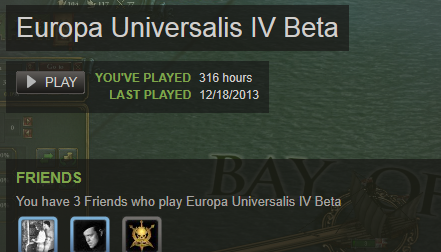/blows off dust.
Is this thing still on?
OK, so I didn’t blog about the many books I read. Nor did any of the five dozen drafts I have ever mature beyond thousands of words that led nowhere.
Now, 2014 was a very good year for me. I feel a little guilty about that because, as Michael McWhertor lays out clearly, 2014 was a terrible year for many people who love games, who make games, who talk about games.
But I fell into a job I love at Paradox Interactive with people I respect working on games that speak to me. I made some amazing new friends, had some great times with old friends, tightened some bonds with people that will always be very important to me. I ate better, exercised worse, drank less, read a lot more. 2014 will go down as a triumph.
Strategy wise, I was on the podcast more than I have been in a few years, and that was loads of fun, since Three Moves Ahead remains the happiest thing I’ve ever made. We didn’t do everything I wanted to do on the podcast. We had fewer developers on, which is OK with me, to be honest. Julian wasn’t on as much as I would like, but it’s very understandable. And we still don’t have nearly enough people on the show that aren’t like me – history-obsessed, middle-class, white men. (I like to hear from people with very different starting points in life, so sue me.)
But yeah, we had some really great shows all year. Fraser Brown and Rowan Kaiser have pretty much graduated to official panelist honours, which is wonderful, since they are smart guys. We did have more women this year than any other year, I think, but we have to do better than four. We had some of my favorite industry people (Chris Remo, Evan Narcisse, Soren Johnson…) on the show. 3MA remains my gifted child, and Rob Zacny continues to do amazing things with it.
When I wasn’t talking about strategy games on the show, I was sometimes opining on them on Twitter, and also on my Ask page. Give me a writing prompt and I can just go, I guess. Bruce threatened to interview me if I didn’t write anything, so that might have worked.
In any case, I sort of enjoyed the year away from blogging, since it gave me a lot of time to read what other people are saying. There is a lot of good strategy game criticism out there, and I think 2014’s criticism has been helped by there not being many really huge strategy titles eating up thoughts. Beyond Earth landed with a bit of a thud, The Sims 4 falls into that weird space where millions play it but no one really writes about it seriously, etc. But smart things were said about Endless Legends, Distant Worlds, Banished, whatever war thing Bruce is writing about (doesn’t matter – always smart things).
I took the time to also play a lot of different games. I dipped into the new hotness, survival sims. I expanded into different types of roguelikes. I tried to learn some really hard wargames and simulations. All of this, I think, has made me a better critic – of more value to you readers and also to my employer.
I won’t make any grand promises about 2015. I will promise to check in more often with some reports on what I am playing.
Tomorrow, though? I talk to Rob Zacny’s article about Ultimate General: Gettysburg.



